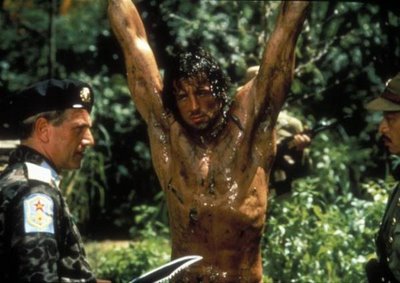
Stallone is the only actor to have a number one film at the American box office for six decades in a row. I guess critics need to bear that in mind if they want to try to mock his acting, writing, directing and overall contribution to cinema. Like it or not, people enjoy his macho schtick. The boy sure has come a long way since his bare bum bobbing in The Party at Kitty and Stud’s. Now I don’t think much of his latter-day efforts, but the stuff he put out during the last century was fantastic, groan-inducing faults ‘n’ all. Just look at 1985 in which he starred in First Blood Part II and Rocky IV, two legendary flicks that grossed a total of $600m worldwide. Mind you, if I ever get to meet the dude, I might still have to punch him on the nose for desecrating Get Carter.
“All I wanna do is go the distance.” Rocky (1976)
The first chapter in the life of Rocky Balboa can lay fair claim to being Stallone’s best film. Sure, it won the Best Picture Oscar but, as we all know, shit like Shakespeare in Love and Ordinary People can walk away with such a bauble. Rocky, though, has endured and become woven into pop culture. Indeed, it’s so good that you forget about the preposterous ‘chance of a lifetime’ plot and instead end up rooting for one of cinema’s greatest heroes.
Rocky is a brawny, ungainly, dim-witted boxer that I fancy is based on Brando’s Terry Malloy. Like Terry, he wasn’t properly managed, people see him as a bum, and life has become a deflated dream. Instead of owning rooftop pigeons, he seeks solace with a pair of pet turtles in his disheveled one-bedroom apartment. His days are spent walking the Philly streets in a porkpie hat and black leather jacket bouncing a ball and sporting the latest cuts and bruises from yet another meaningless club fight.
He’s also an enforcer for a loan shark but his heart is not in it. He prefers giving rambling, unwanted advice to the local kids, talking to himself, and trying to think up jokes to impress a bespectacled, painfully shy pet shop employee. It’s a life going nowhere, best summed up by his elderly, erstwhile trainer Mickey (Burgess Meredith): “You had the talent to become a good fighter, but instead of that you became a leg-breaker to some cheap, second-rate loan shark.”
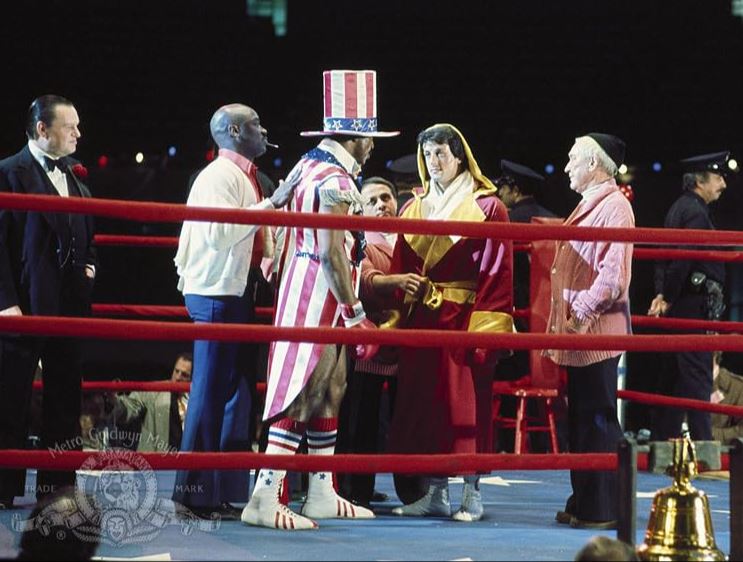
Life’s a curious thing, though, and sometimes you just gotta hang in there for your luck to change. This occurs when the latest opponent of the Muhammad Ali-like world heavyweight champion Apollo Creed (Carl Weathers) busts a hand in training, leaving the promoters desperately scrambling to keep any sort of match on schedule. The fast-talking, super-confident Creed believes America is the ‘land of opportunity’ and decides to offer the title shot to an unknown. Rocky is chosen because Creed likes his nickname ‘The Italian Stallion’ so it’s just as well he didn’t call himself The Dago Donkey.
Rocky is modest, sensitive, uncertain, generous and happy to label Creed ‘the best’. Unlike so many of Stallone’s future performances, his breakthrough role is neither cartoonish nor overly macho. By allowing us to see the uncertainty and fear in his heart, it’s much easier to spend two hours in his company than the sour likes of Jake LaMotta. Rocky lives in a believable downmarket world, populated by characters with a real sense of history.
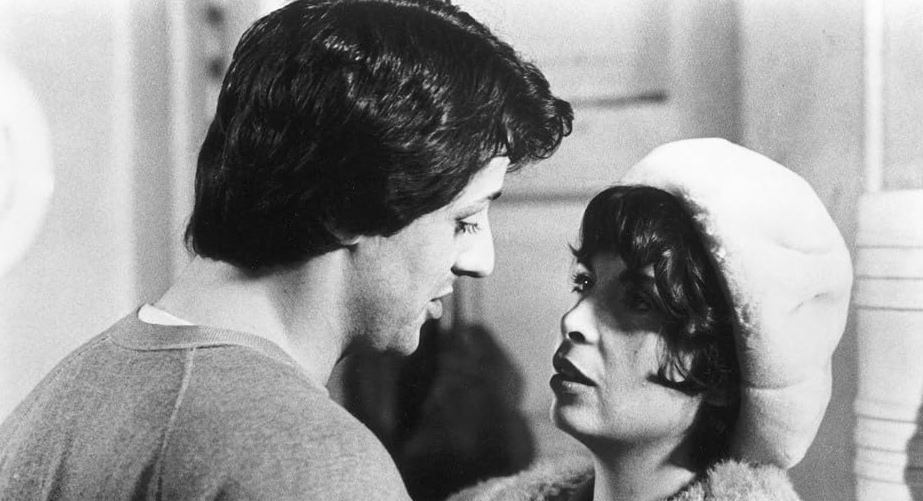
Many scenes are superb, such as the first time he kisses Adrian (Talia Shire) wearing a holed vest during their tentative, touching romance and his initial, pain-laced rejection of Mickey’s belated offer to become his manager. By the time his alarm clock goes off at 4am on his first day of training, we’re fully onboard as he hauls himself shivering out of bed to drink five raw eggs before stepping out onto a deserted, bloody cold-looking street. The film has got so much momentum and heart at this point that you have to see it through, even if Mickey’s training regime (and fifty years of experience in the fight game) appears to involve little more than a complete lack of sparring partners and loosely tying a bit of string between the southpaw’s ankles.
Rocky remains a staggering achievement, a combination of solid script, tremendous casting, perfect performances, an uplifting score, outstanding location work and sure direction. Old-fashioned it might be, but I doubt we’ll ever forget the stirring sight of Philly’s favorite beef-punching son running through the streets in his gray sweatpants before hurtling up those Rocky Steps to do his celebratory jig.
And remember, Stallone wrote this one, too.
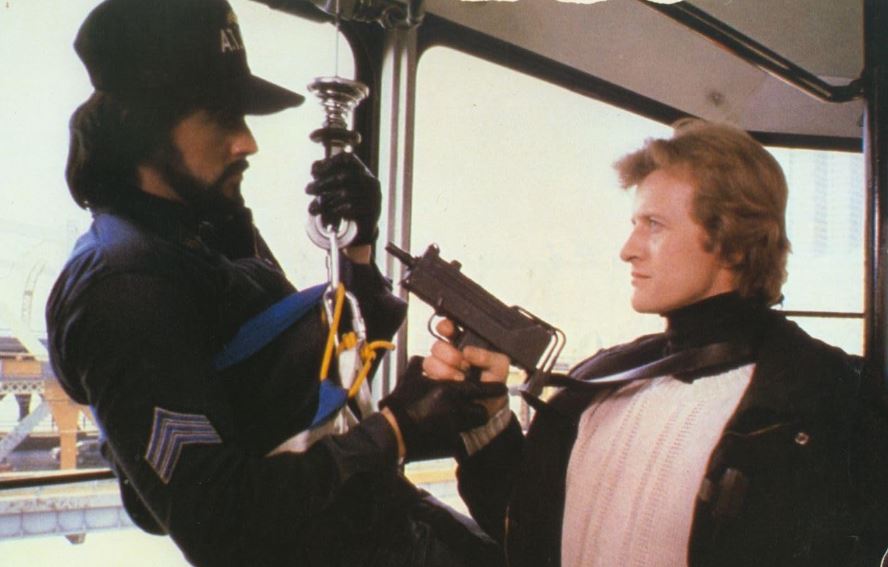
“I didn’t join the police force to kill people.” Nighthawks (1981)
By the start of the eighties Stallone could be excused for feeling a little insecure. Yes, he had that massive box-office success with the first two Rockys, but those wise gods (otherwise known as the movie-going public) weren’t embracing him in anything else. They hadn’t cared much for his turn as a union leader in the mediocre F.I.S.T. and had fled from his directorial debut in the dull wrestling drama Paradise Alley. Would he fare better as a cross-dressing cop?
Well, Nighthawks is a few steps up from F.I.S.T. and Alley in that it’s much more entertaining. Crucially, it also made some money. Job done, except it ended up presenting Sly with a new problem: he got usurped by a co-star. For have no doubts that Rutger Hauer’s turn as a ruthless international terrorist enables him to leave Stallone choking on his charismatic dust.
Sly is Sergeant Deke DaSilva. He gets things off to a great start by dressing as a somewhat hefty housewife to walk down one of those clichéd, garbage-strewn, mugger-filled New York streets from the early eighties. It’s no real surprise when a knife-wielding perp jumps out. “Come on, he-man,” Deke growls, pulling off his facial disguise. “I’ve got the hots for you!” Remember, he might have just revealed a manly beard and be talking tough, but he’s still holding a handbag and wearing a skirt. No matter, for the fleeing punk proves a poor match in the ensuing chase and fisticuffs. “You have the right to remain silent,” Deke says while dragging his unconscious form along a train station platform.
Meanwhile, Wolfgar (Hauer) is busy walking into a London department store to leave a bomb. The ease with which he does this (while complimenting the pretty assistant at the perfume counter) is chilling. Unfortunately, he doesn’t just blow up those dime-a-dozen adults but also some lovely kiddiewinks, a fact that makes his IRA employer look bad. This forces him to flee to America for an unplanned rendezvous with the newly formed Anti-Terrorist Action Command, a hardcore unit that Deke has just been drafted into. Boss Peter Hartman (Nigel Davenport) is an obsessive, desk-thumping fascist quite happy to tell his recruits: “To combat violence, you need greater violence.” Surprisingly, Inspector Harry Callahan is not a member.
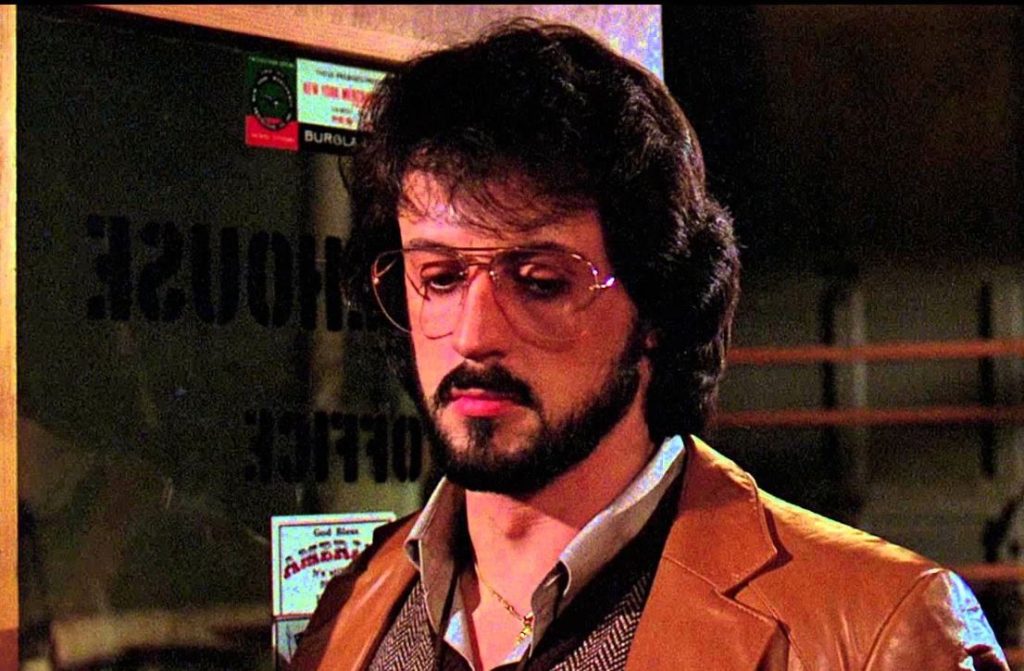
Nighthawks has a terrific opening forty minutes that effortlessly puts some juicy pieces in place. These include lively direction, an energetic score, a fondness for profanity and excellent use of locations. With his fluffy hair and beard, sporadic fondness for a beret and sleeveless sweater, Sly might look like he’s just wandered out of a slightly camp version of Bachman Turner Overdrive but he still manages to put in a solid shift as a macho, hot-headed Vietnam vet. Working alongside is his partner Sergeant Matthew Fox (Billy Dee Williams, fresh off Empire Strikes Back). This pair of ‘fucking glory boys’ boasts a knockabout chemistry based on a hard-earned, deep-seated trust, but they pale next to Wolfgar’s silky, multi-lingual villainy.
Nighthawks begins to wobble when you start examining it a bit more closely, such as how Wolfgar manages to smuggle into America enough weaponry to blow up half of Broadway. Five minutes later his oblivious new girlfriend discovers this unlocked, badly hidden cache. Hmm, bit clumsy, son… Then again, for a self-proclaimed ‘remarkable fellow’, he really does make a lot of howlers. And this is the flick’s main problem. The implausibilities and contrivances (from Deke spotting the surgically altered Wolfgar in a nightclub right through to its unintentionally funny finale) keep stacking up. Do terrorists allow themselves to get dragged into acrimonious personal disputes? Nighthawks is well-paced, though, and I did enjoy its occasional forays into New York’s disco scene. It also offers a big surprise in that Sly doesn’t once take his shirt off.
Hauer would turn the blue-eyed magnetism up to eleven in the following year’s Blade Runner. As for Stallone, he obviously enjoyed his first effort playing a hard as nails cop in that he’d return to such manly territory many more times.
Leave a Reply